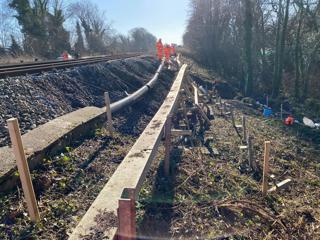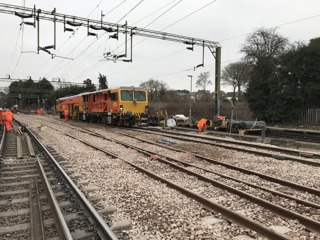The Office of Rail and Road and passenger watchdog Transport Focus convened staff of train operators and Network Rail for a workshop on January 17, to discuss possible policy changes and recommendations regarding stranded trains.
Incidents including the stranded Eurostar train that saw passengers stuck in the Channel Tunnel for seven hours in 2023, and the high-profile self-evacuation of passengers at Ladbroke Grove in December 2023 (RAIL 999), have brought the processes which are currently in place into sharper focus.
The Office of Rail and Road and passenger watchdog Transport Focus convened staff of train operators and Network Rail for a workshop on January 17, to discuss possible policy changes and recommendations regarding stranded trains.
Incidents including the stranded Eurostar train that saw passengers stuck in the Channel Tunnel for seven hours in 2023, and the high-profile self-evacuation of passengers at Ladbroke Grove in December 2023 (RAIL 999), have brought the processes which are currently in place into sharper focus.
ORR and Transport Focus began examining the issue last year, and the regulator wrote to the wider industry to seek assurances that documented plans and procedures were in place that were in line with the then-published guidance.
Richard Hines, Director of Railway Safety at ORR, told RAIL that the workshop produced a broadly positive response. “The industry is coming back to us with their responses and a willingness to make changes, and the letter has certainly accelerated that thinking. On the day, there was a real energy and keenness to try and resolve some of these issues,” he said.
ORR and Transport Focus have initially reviewed 178 incidents of stranded trains over a 70-day period - including five incidents of passengers walking across the track. The study found that some procedures tend not to go far enough to ensure passenger safety, and some are not sufficiently well-executed in practice. It also found the current guidance may need to be strengthened.
Hines added: “When it comes to policies like this, I don’t think we’ll ever be done. We want to ensure that these kinds of incidents are at the forefront of the industry’s minds. We’d like to see improvements in pre-planning, and practical response on the day. Too often, we found that many were not prepared to act and make decisions early.”
However, Hines did extend praise to the industry for the responses so far, and for the collaboration seen at the event.
“The event was particularly good for understanding everybody’s positions on the policies in place. It really is a collaborative effort to ensure that we have consistency across the industry for all the users of the network, and to make sure we are safely getting passenger’s home.”
Hines highlighted that data now exists that can help Network Rail and operators understand the circumstances that happen once a train is stranded.
ORR is hoping that a similar event and collaboration with the Rail Safety and Standards Board in the next six months will help shape the new policy further.
Login to continue reading
Or register with RAIL to keep up-to-date with the latest news, insight and opinion.

















Ray O'B - 11/02/2025 14:56
It would be useful to follow-up this initiative with a way to reduce the time trains are halted by suicides and by trespassing. In both cases, the industry seems to have gone backwards e.g. last year a two hour stop between Didcot and Swindon for an alleged trespass incident; in January 2024 three hour delays for a suicide at Maidenhead on a four track line.